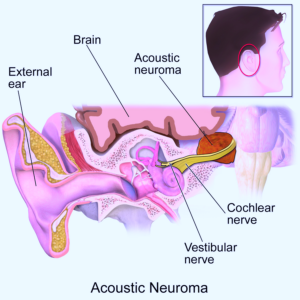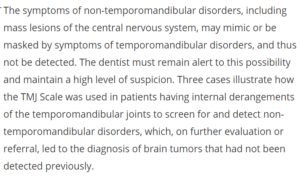
An assortment of benign conditions can lead to TMJ problems, but so can a variety of cancers.
This is why if your TMJ pain hasn’t resolved despite dental-based treatment, you should request an MRI of your head, plus bloodwork, to see if there are signs of cancer or benign tumors.
Medical Conditions that Can Cause TMJ Pain and Problems
“There is a lot of research on this now,” says Dr. Alireza Panahpour, DDS, author of “The Good Dentist.”
Dr. Panahpour explains, “Anything that’s a chronic issue on the system can become a cause of TMJ, including physical, mental or spiritual issues — can eventually become a cause of TMJ.
“Many hormonal, thyroid, autoimmune and Parkinson’s patients develop TMJ.
“Regularly, when women go through pregnancy, many start clenching and grinding their teeth.”
Overnight clenching and grinding of the teeth is called bruxism, and this is a well-documented instigator of TMJ disorder.
“It can be caused by anything that causes a chronic stress on the body,” says Dr. Panahpour.
Benign and Malignant Tumors As a Cause of TMJ Symptoms
Yes, there are cases of people who have been misdiagnosed as having a primary TMJ disorder — and treated accordingly — while the root cause of the TMJ and facial pain symptoms was a benign tumor or cancer.
And all the while the cancer continued to grow until finally, the non-responsive TMJ symptoms triggered suspicion for a more serious cause such as an acoustic neuroma.

An acoustic neuroma is a benign brain tumor that grows in the ear canal and can cause symptoms similar to TMJ disorder. Source: Blausen.com staff
When TMJ problems stem from a primary and benign mandibular malfunction, a dentist with expertise in orofacial pain and temporomandibular joint disorders should be consulted.
Dentists are often the first medical professionals to evaluate patients with new-onset, classic TMJ symptoms, as many incorporate TMJ screenings into routine dental exams.
Their specialized knowledge enables them to diagnose and manage TMJ issues effectively, addressing both the functional and pain aspects of the disorder.
If necessary, they can recommend further treatment or refer patients to other specialists.
Early intervention by an experienced dentist can help alleviate symptoms and prevent the progression of TMJ disorders.
TMJ disorder symptoms include pain when chewing, and a clicking and/or grating sensation when chewing.
Other symptoms include facial pain, ear pain and headaches.
These can be caused by benign tumors and cancer. But cancer can also cause pain when chewing and a clicking sound.
A paper in The Journal of Craniomandibular & Sleep Practice (Levitt et al) states:

There are multiple types of cancer that can cause symptoms that very closely mimic those of TMJ disorder.

Dr. Panahpour’s approach to dental health encompasses the patient’s diet, immune and structural integrity, plus all the traditional treatments of a conventional dental practice.
 Lorra Garrick has been covering medical, fitness and cybersecurity topics for many years, having written thousands of articles for print magazines and websites, including as a ghostwriter. She’s also a former ACE-certified personal trainer.
Lorra Garrick has been covering medical, fitness and cybersecurity topics for many years, having written thousands of articles for print magazines and websites, including as a ghostwriter. She’s also a former ACE-certified personal trainer.
.

























